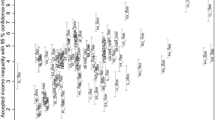Abstract
Aspects of institutional quality vary substantially across countries, but are quite persistent over time. Further, institutional quality is correlated with income inequality, even among democracies. To account for these regularities, we offer a model where individual attitudes, toward inequality or trust in government, feature in voters’ preferences. The model displays path dependence, whereby inequality and institutional quality feed each other. It is suggested that this may explain the long shadow of historical legacies of postcolonial experiences. Simple correlations of reported attitudes using data from the World Values Surveys are consistent with the model.
Similar content being viewed by others
References
Acemoglu, D.: Oligarchic versus democratic societies. J. Eur. Econ. Assoc. 6, 1–44 (2008)
Acemoglu, D., Robinson, J.: Why did the west extend the franchise? Democracy, inequality, and growth in historical perspective. Q. J. Econ. 115(4), 1167–1199 (2000)
Acemoglu, D., Robinson, J.: Persistence of power, elites, and institutions. Am. Econ. Rev. 98, 267–293 (2008)
Acemoglu, D., Johnson, S., Robinson, J.: Institutions as a Fundamental Cause of Development. In: Aghion, P., Durlauf, S. (eds.) Handbook of Economic Growth, pp. 386–472. Elsevier, Amsterdam (2005)
Acemoglu, D., Naidu, S., Restrepo, P., and Robinson, J.A.: Democracy does cause growth. J. Polit. Econ (2019 forthcoming)
Alesina, A., Cozzi, G., Mantovan, N.: The Evolution of Ideology, Fairness, and Redistribution. Econ. J. 122(565), 1244–1261 (2012)
Becker, S.O., Boeckh K., Hainz C., Woessmann L.: The Empire Is Dead, Long Live the Empire! Long-Run Persistence of Trust and Corruption in the Bureaucracy. Econ. J. (2014)
Cervellati, M., Fortunato, P., Sunde, U.: Hobbes to Rousseau: inequality, institutions and development. Econ. J. 118, 1354–1384 (2008a)
Cervellati, M., Fortunato, P., Sunde, U.: Are all democracies equally good? The role of interactions between political environment and inequality for rule of law. Econ. Lett. 99(3), 552–556 (2008b)
Chong, A., Gradstein, M.: Inequality and institutions. Rev. Econ. Stat. 89, 454–465 (2007)
Engerman, S., Sokoloff, K.: Factor endowments, institutions, and differential paths of growth among New World economies: a view from economic historians of the United States. In: Haber, S. (ed.) How Latin America Fell behind. Stanford University Press, Stanford (1997)
Epp, D., Borghetto E.: Economic Inequality and Legislative Agendas in Europe. mimeo. (2018)
Gershman, B.: The two sides of envy. J. Econ. Growth, Forthcoming. 19, 407–438 (2014)
Glomm, G., Ravikumar, B.: Public versus private Investment in Human Capital: endogenous growth and income inequality. J. Polit. Econ. 100, 818–834 (1992)
Gradstein, M.: Inequality, democracy, and the protection of property rights. 2007. Econ. J. 117, 252–269 (2007)
Gradstein, M.: Institutional traps and economic growth. Int. Econ. Rev. 49, 1043–1066 (2008)
Grosfeld, I., Zhuravskaya, E.: Cultural vs. economic legacies of empires: evidence from the partition of Poland. J. Comp. Econ. 43, 55–75 (2015)
Grossman, H., Kim, M.: Swords or plowshares? A theory of the security of claims to property. J. Polit. Econ. 103, 1275–1288 (1995)
ICRG: www.prsgroup.com (2018)
Inglehart, R., Haerpfer C., Moreno A., Welzel C., Kizilova K., Diez-Medrano J., Lagos M., Norris P., Ponarin E. & Puranen B. et al. (eds.): World Values Survey: All Rounds-Country-Pooled Datafile http://www.worldvaluessurvey.org/WVSDoc umentationWVL.jsp. Madrid: JD Systems Institute (2014)
Kaufmann, D., Kraay, A., Mastruzzi, M: Mastruzzi Governance Matters VIII: Aggregate and Individual Governance Indicators, 1996-2008. World Bank Policy Research Working Paper No. 4978 (2009)
Kuziemko, I., Norton, M.I., Saez, E., Stantcheva, S.: How elastic are preferences for redistribution? Evidence from randomized survey experiments. Am. Econ. Rev. 105, 1478–1508 (2015)
Li, H.L.S., Zou, H.: Explaining international and intertemporal variations in income inequality. Econ. J. 108, 26–43 (1998)
Lindbeck, A., Nyberg, S., Weibull, J.: Social norms and economic incentives in the welfare state. Q. J. Econ. 114, 1–35 (1999)
Litina, A.: Great expectations: the persistent effect of institutions on culture. mimeo. (2014)
Rajan, R.: Rent preservation and the persistence of underdevelopment. Am. Econ. J. Macroecon. 1, 178–218 (2009)
Sonin, K.: Why the rich may favor poor protection of property rights. J. Comp. Econ. 31, 715–731 (2003)
World Bank: World Development Indicators. www.worldank.org (2018)
World Inequality Report: World Inequality Lab. www.wid.world (2018)
Acknowledgements
We are grateful to Gianmarco León, Joan Martínez, Tareena Musaddiq, Vanessa Rios, two anonymous referees and the editor, Guillermo Cruces for very helpful comments and suggestions. All remaining errors are obviously ours.
Author information
Authors and Affiliations
Corresponding author
Additional information
Publisher’s note
Springer Nature remains neutral with regard to jurisdictional claims in published maps and institutional affiliations.
Electronic supplementary material
ESM 1
(DOCX 41 kb)
Rights and permissions
About this article
Cite this article
Chong, A., Gradstein, M. Institutional persistence, income inequality, and individual attitudes. J Econ Inequal 17, 401–413 (2019). https://doi.org/10.1007/s10888-019-09414-w
Received:
Accepted:
Published:
Issue Date:
DOI: https://doi.org/10.1007/s10888-019-09414-w




